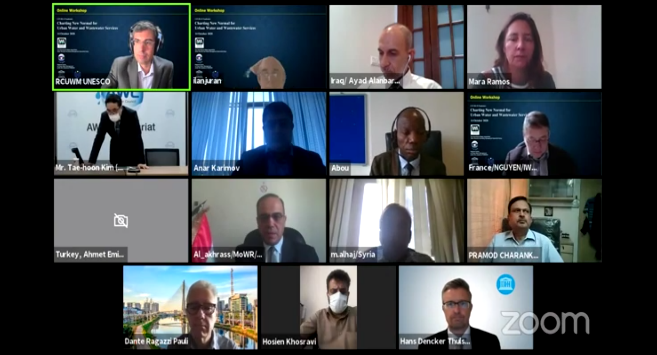Online Workshop on “Charting New Normal for Urban Water & Wastewater Services” 14 October 2020
The online workshop on “Charting New Normal for Urban Water & Wastewater Services” was held on 14 October 2020 as one of the approved proposals of the RCUWM Governing Board Meeting (GBM-2020) which was held online (e-meeting) on Wednesday 23 September 2020. This online workshop has been organized jointly with UNESCO Regional Centre on Urban Water Management (RCUWM-Tehran), the International Water Association (IWA), and the Intergovernmental Hydrological Programme (IHP) of UNESCO. Around 80 participants (18% female) from 27 countries including Afghanistan, Armenia, Australia, Azerbaijan, Brazil, Canada, Egypt, France, Germany, India, Indonesia, Iran, Iraq, Japan, Korea, Kuwait, Netherland, Nigeria, Oman, Pakistan, Portugal, Qatar, Rwanda, Switzerland, Syria, Turkey, and the USA participated in this event.
The main objective of this online workshop was to share recent experiences, activities, and lessons learned on business continuity planning in the water and sanitation sectors during the COVID-19 pandemic. The main topics of the event were as follows:
- Water consumption changing pattern and water production changing conditions
- Water bills and financial stability
- Ensuring essential staff safety
- Public information & customer interaction
Several competent lecturers from Australia, Brazil, France, Indonesia, Iran, Switzerland, and the USA delivered their keynote speeches on relevant topics of the event as follows:
- Abou Amani, Division of Water Sciences & Secretary of Intergovernmental Hydrology Program (IHP)
- Bruno Nguyen, Water Security, and Safety Management Specialist (W2SM) Group – International Water Association (IWA)
- Dante Ragazzi Pauli, Integrated Planning Superintendent – The Water Utility of the State of Sao Paulo (SABESP), Brazil
- Ali Chavoshian, the Regional Centre on Urban Water Management (RCUWM) under the auspices of UNESCO, Iran
- Ilan Juran, New York University Polytechnic Institute & Executive Director – W SMART Association, Paris
- Gerard Luyet, Director of Geneva Water Supply
- Amit Chanan, Director of City Project with City of Sydney
- Alexandros Makarigakis, Programme Specialist, Water for Human Settlements – Natural Sciences Sector
Furthermore, some water utility managers and experts from states including Armenia, India, Iran, Morocco, Oman, Pakistan, Qatar, Republic of Korea, and Turkey shared their perspectives, experiences, and responses to the challenges caused by COVID-19 and the lessons being learned in adapting to a changing situation, and the main messages they are communicating to their customers.
The most important highlights of the event were:
- Water consumption pattern has not been considered as an increasing trend worldwide due to lockdown in industrial activities, administrative works, tourism industry, etc.
- Exempting residents from social tariff payments on water
- Distributing food and hygiene kits amongst needy people
- Scaling up of treatment processes in the network to combat COVID-19 pandemic
- Frequent water quality monitoring
- Prioritizing staff and budgets for urgent failures
- Providing water, sanitation, and hygiene services to the most vulnerable segment of the community (i.e. disabled, elderly people, children, pre-urban and slum communities, remote and indigenous communities, etc.)
- Upgrading and renovate installations of the water and wastewater facilities to fulfill the increasing demand for water during the COVID-19 pandemic
- Postponing payment of water bills
- Providing subsidies to the water utilities or to the users
- Suspending water shutoffs for unpaid bills
- Considering average historical consumption records instead of reading water meters in the field
- Social solidarity campaigns: “Pay-it-forward (bill on the hook)” practice: allows people to voluntarily pay an outstanding bill of an anonymous person who is not able to pay
- Working from home and new rules of operations, safe distancing, etc. to reduce health risks
- Providing sanitation products to all personnel including working staff and visitors to water supply facilities (hand sanitizer and protection mask)
- Enhancing awareness by demonstrating COVID-19 posters and preventive guidelines at all project sites



